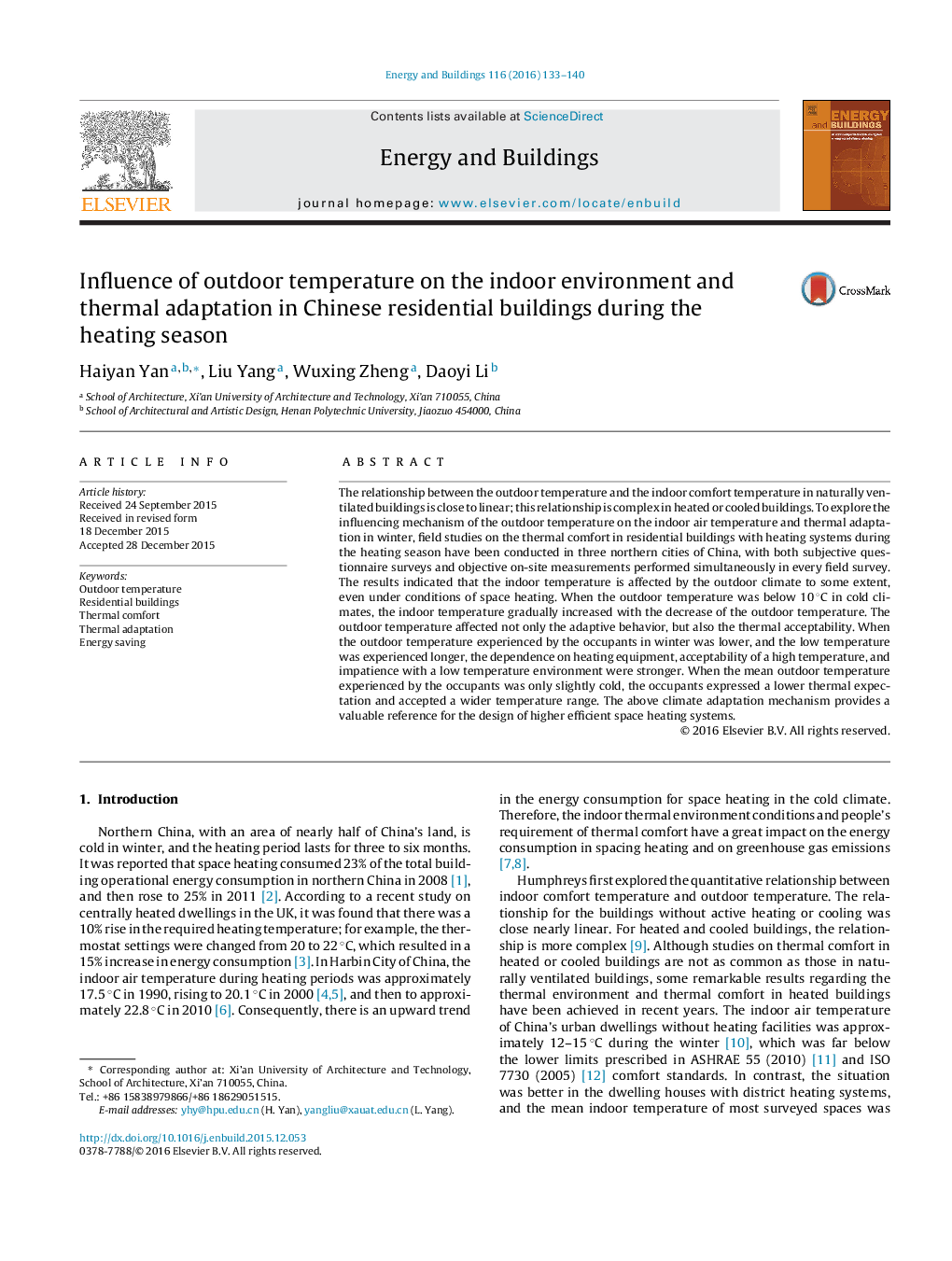| کد مقاله | کد نشریه | سال انتشار | مقاله انگلیسی | نسخه تمام متن |
|---|---|---|---|---|
| 6730453 | 504021 | 2016 | 8 صفحه PDF | دانلود رایگان |
عنوان انگلیسی مقاله ISI
Influence of outdoor temperature on the indoor environment and thermal adaptation in Chinese residential buildings during the heating season
ترجمه فارسی عنوان
تأثیر دمای هوای داخل محیط داخلی و سازگاری حرارتی در ساختمان های چینی در طول فصل گرم
دانلود مقاله + سفارش ترجمه
دانلود مقاله ISI انگلیسی
رایگان برای ایرانیان
کلمات کلیدی
دما در فضای باز، ساختمان های مسکونی، راحتی حرارتی، سازگاری حرارتی، ذخیره انرژی،
ترجمه چکیده
رابطه بین درجه حرارت در فضای باز و درجه حرارت راحتی در ساختمان در ساختمان های به طور طبیعی تهویه نزدیک خطی است؛ این رابطه در ساختمان های گرم و یا سرد است. برای کشف مکانیزم تأثیرگذار دمای هوای داخل هوا در دمای هوا و تغییرات حرارتی در زمستان، مطالعات میدانی در مورد راحتی حرارتی در ساختمان های مسکونی با سیستم های گرمایشی در طول فصل گرم در سه شهر شمالی چین انجام شده است که هر دو پرسشنامه ذهنی نظرسنجی ها و اندازه گیری های انجام شده در سایت به طور همزمان انجام می شود. نتایج نشان داد که درجه حرارت محیط داخلی در برخی از مناطق حتی تحت شرایط گرم شدن فضای مورد استفاده قرار می گیرد. هنگامی که درجه حرارت در فضای باز در دمای هوای سرد، کمتر از 10 درجه سانتیگراد بود، دمای داخلی به کاهش دما در فضای باز ادامه می یافت. دما در فضای باز نه تنها رفتار سازگار، بلکه همچنین پذیرش حرارتی را نیز تحت تاثیر قرار می دهد. هنگامی که درجه حرارت در فضای باز ساکنان در فصل زمستان کمتر بود و درجه حرارت پایین بیشتر طول می کشد، وابستگی به تجهیزات گرمایشی، پذیرش دمای بالا و بی قراری با محیط کم دما قوی تر بود. هنگامی که میانگین درجه حرارت در فضای باز توسط اشغالگران تنها کمی سرد بود، ساکنان انتظارات حرارت کمتری را نشان دادند و دامنه وسیع تر دما را پذیرفتند. مکانیزم سازگاری با شرایط محیطی یک مرجع ارزشمند برای طراحی سیستم های گرمای فضای کارآمد بالاتر است.
موضوعات مرتبط
مهندسی و علوم پایه
مهندسی انرژی
انرژی های تجدید پذیر، توسعه پایدار و محیط زیست
چکیده انگلیسی
The relationship between the outdoor temperature and the indoor comfort temperature in naturally ventilated buildings is close to linear; this relationship is complex in heated or cooled buildings. To explore the influencing mechanism of the outdoor temperature on the indoor air temperature and thermal adaptation in winter, field studies on the thermal comfort in residential buildings with heating systems during the heating season have been conducted in three northern cities of China, with both subjective questionnaire surveys and objective on-site measurements performed simultaneously in every field survey. The results indicated that the indoor temperature is affected by the outdoor climate to some extent, even under conditions of space heating. When the outdoor temperature was below 10 °C in cold climates, the indoor temperature gradually increased with the decrease of the outdoor temperature. The outdoor temperature affected not only the adaptive behavior, but also the thermal acceptability. When the outdoor temperature experienced by the occupants in winter was lower, and the low temperature was experienced longer, the dependence on heating equipment, acceptability of a high temperature, and impatience with a low temperature environment were stronger. When the mean outdoor temperature experienced by the occupants was only slightly cold, the occupants expressed a lower thermal expectation and accepted a wider temperature range. The above climate adaptation mechanism provides a valuable reference for the design of higher efficient space heating systems.
ناشر
Database: Elsevier - ScienceDirect (ساینس دایرکت)
Journal: Energy and Buildings - Volume 116, 15 March 2016, Pages 133-140
Journal: Energy and Buildings - Volume 116, 15 March 2016, Pages 133-140
نویسندگان
Haiyan Yan, Liu Yang, Wuxing Zheng, Daoyi Li,
